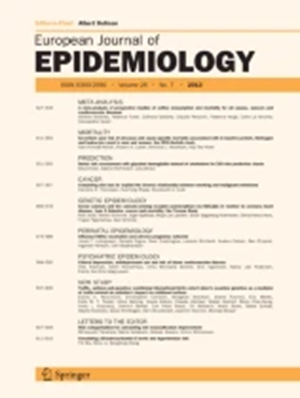Plant-based dietary patterns and breast cancer risk in the European prospective investigation into cancer and nutrition (EPIC) study.
IF 5.9
1区 医学
Q1 PUBLIC, ENVIRONMENTAL & OCCUPATIONAL HEALTH
引用次数: 0
Abstract
While previous literature suggests that plant-based diets may be associated with a lower risk of breast cancer, evidence remains inconsistent. In this study, we investigated the association between adherence to plant-based diets and breast cancer risk in the European Prospective Investigation into Cancer and Nutrition (EPIC) study. Overall plant-based diet index (PDI), healthful (hPDI), and unhealthful PDI (uPDI) were calculated, and multivariable Cox models were used to estimate hazard ratios (HR) and 95% confidence intervals (CI) of breast cancer for the three indices. Mediation analysis was performed to assess the role of body mass index (BMI) and waist circumference (WC) in the association between hPDI and postmenopausal breast cancer risk. Over a median follow-up of 14.9 years, 10,805 incident invasive breast cancer cases were identified among 258,343 women. In the multivariable model, not adjusted for BMI, higher adherence to hPDI was inversely associated with breast cancer risk, with HR per 1-SD increase [95% (CI)] of 0.97 (0.94, 0.99). The corresponding HRs (95% CI) per 1-SD increase for overall PDI and uPDI were 0.98 (0.96, 1.00) and 1.01 (0.99, 1.03), respectively. The associations between hPDI and postmenopausal breast cancer were partly explained by BMI and WC, which mediated 30% and 52% of this association, respectively. Higher adherence to hPDI was associated with a slightly lower total breast cancer risk. For postmenopausal breast cancer, this association was partly explained by lower BMI or WC. These findings suggest that promoting healthful plant-based diets could support breast cancer risk reduction.欧洲癌症与营养前瞻性调查(EPIC)研究中的植物性饮食模式与乳腺癌风险
虽然以前的文献表明植物性饮食可能与较低的乳腺癌风险有关,但证据仍然不一致。在这项研究中,我们在欧洲癌症与营养前瞻性调查(EPIC)研究中调查了坚持植物性饮食与乳腺癌风险之间的关系。计算总体植物性饮食指数(PDI)、健康饮食指数(hPDI)和不健康饮食指数(uPDI),并使用多变量Cox模型估计这三个指数的乳腺癌风险比(HR)和95%置信区间(CI)。采用中介分析来评估体质指数(BMI)和腰围(WC)在hPDI与绝经后乳腺癌风险之间的关系中的作用。在14.9年的中位随访中,在258343名女性中发现10805例浸润性乳腺癌病例。在未调整BMI的多变量模型中,高依从性hPDI与乳腺癌风险呈负相关,每1-SD增加的HR [95% (CI)]为0.97(0.94,0.99)。总PDI和uPDI每增加1-SD相应的hr (95% CI)分别为0.98(0.96,1.00)和1.01(0.99,1.03)。BMI和WC可以部分解释hPDI和绝经后乳腺癌之间的关联,它们分别介导了30%和52%的关联。较高的hPDI依从性与较低的乳腺癌总风险相关。对于绝经后乳腺癌,这种关联部分可以用较低的BMI或WC来解释。这些发现表明,促进健康的植物性饮食可以帮助降低乳腺癌的风险。
本文章由计算机程序翻译,如有差异,请以英文原文为准。
求助全文
约1分钟内获得全文
求助全文
来源期刊

European Journal of Epidemiology
医学-公共卫生、环境卫生与职业卫生
CiteScore
21.40
自引率
1.50%
发文量
109
审稿时长
6-12 weeks
期刊介绍:
The European Journal of Epidemiology, established in 1985, is a peer-reviewed publication that provides a platform for discussions on epidemiology in its broadest sense. It covers various aspects of epidemiologic research and statistical methods. The journal facilitates communication between researchers, educators, and practitioners in epidemiology, including those in clinical and community medicine. Contributions from diverse fields such as public health, preventive medicine, clinical medicine, health economics, and computational biology and data science, in relation to health and disease, are encouraged. While accepting submissions from all over the world, the journal particularly emphasizes European topics relevant to epidemiology. The published articles consist of empirical research findings, developments in methodology, and opinion pieces.
 求助内容:
求助内容: 应助结果提醒方式:
应助结果提醒方式:


